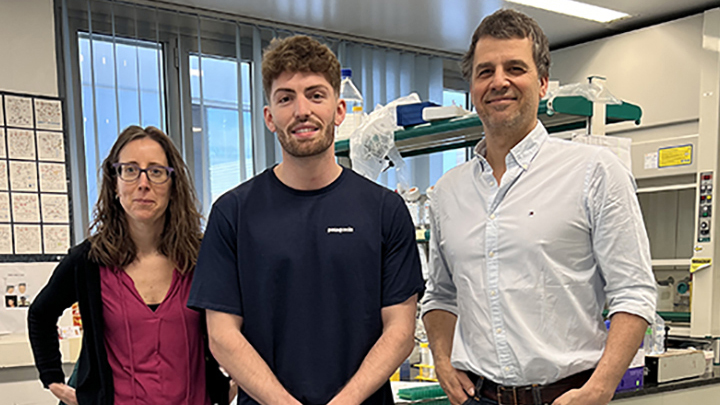Defects in the blood vessel network of the central nervous system have been linked to early symptoms of neurodegenerative diseases such as Alzheimer’s disease and amyotrophic lateral sclerosis (ALS). It is this complex vascular network that provides the necessary nutrients — especially glucose and oxygen — to activate all neuronal functions. Now, a study led by the Bellvitge Biomedical Research Institute (IBIDELL) and the University of Barcelona reveals that the TDP-43 protein is essential for forming a stable and mature blood vessel network in the central nervous system.
According to the study, featured on the cover of the journal JCI Insight, the TDP-43 protein is also critical in maintaining the integrity of the blood-brain barrier, which prevents toxins and pathogens from reaching the central nervous system.
The project is led by Professor Eloi Montañez, principal investigator of the Systemic, Vascular Diseases and Ageing group of IDIBELL and UB, and involves teams from the Faculty of Biology and the Institute of Biomedicine of the UB (IBUB), the Josep Carreras Leukaemia Research Institute, and the National Centre for Genomic Analysis (CNAG-CRG).
What is the role of the TDP-43 protein in the vascular system?
The TDP-43 protein is a key factor in nervous system function and neuronal plasticity. It is a DNA- and RNA-binding protein that regulates gene expression, and its dysfunction has been associated with various neurodegenerative disorders.
Although much progress has been made recently in understanding the functions of TDP-43 in neurons, its exact role in the endothelial cells that make up the circulatory system, the formation of new blood vessels (angiogenesis) and vascular function was not yet known.
“The study reveals for the first time that TDP-43 is essential for the formation and stability of blood vessels in the central nervous system, and for the integrity of the blood-brain barrier”, says Professor Montañez, from the UB’s Department of Physiological Sciences.
The vascularization of the central nervous system and the formation of the blood-brain barrier are regulated by different signalling pathways. For example, the integrin signalling pathway that regulates the interaction of cells with the extracellular matrix and the signalling carried out by the transcription factor β-catenin.
“In the study, we found that TDP-43 deficiency alters the extracellular matrix that surrounds blood vessels and reduces β-catenin signalling in endothelial cells”, says the researcher. “Thus, mice without endothelial TDP-43 protein show multiple haemorrhages and vascular degeneration in the brain and spinal cord.”
Vascular defects and inflammatory response in neurosciences
The authors also identify TDP-43 in endothelial cells as a potential contributing factor to the vascular defects that trigger the inflammatory response observed in patients diagnosed with TDP-43-associated diseases.
“Some alterations in the blood vessels of the central nervous system — defects in the integrity of the blood-brain barrier or degeneration of endothelial cells — are associated with inflammatory and immune responses that can cause neuronal loss. This process of neuronal degeneration underlies the origin or progression of various neurological disorders — stroke, diabetic retinopathy — and some neurodegenerative diseases such as Alzheimer’s disease, ALS or LATE (Limbic-predominant age-related TDP- 43 encephalopathy).
The study will help to better understand the molecular mechanisms linking vascular defects and neuroinflammation. “Our goal now is to analyse whether defects in TDP-43 protein function in the endothelium of mature vessels could be involved in ALS or other TDP-43-associated pathologies due to increased vascular permeability or inflammatory processes,” Montañez concludes.
The Bellvitge Biomedical Research Institute (IDIBELL) is a biomedical research center created in 2004. It is participated by the Bellvitge University Hospital and the Viladecans Hospital of the Catalan Institute of Health, the Catalan Institute of Oncology, the University of Barcelona and the City Council of L’Hospitalet de Llobregat.
IDIBELL is a member of the Campus of International Excellence of the University of Barcelona HUBc and is part of the CERCA institution of the Generalitat de Catalunya. In 2009 it became one of the first five Spanish research centers accredited as a health research institute by the Carlos III Health Institute. In addition, it is part of the “HR Excellence in Research” program of the European Union and is a member of EATRIS and REGIC. Since 2018, IDIBELL has been an Accredited Center of the AECC Scientific Foundation (FCAECC).

